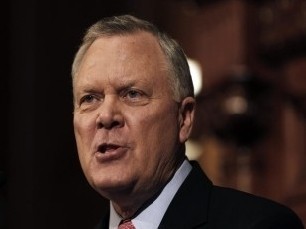In his first budget as Georgia's chief executive, Deal slashed state bonding nearly in half, from the roughly $1 billion a year sought by his predecessor, Sonny Perdue, to a relatively modest $563 million.
But is borrowing less really good for the economy?
Perdue, a fellow Republican, boosted state borrowing as the recession bore down on Georgia in an effort to jump start the economy. Deal has taken the opposite approach: Not only did he reduce overall state borrowing for college, school and other infrastructure projects this year, he also used his veto to pen to strike funding for another 11 bond projects in the university system worth more than $40 million.
The state has $9.2 billion in outstanding bonds on its books. The annual debt service is $1.2 billion, or about 7 percent of the state's $18.3 billion budget.
With the state's jobless rate at 10.1 percent - a full percentage point above the national average - some argue that more borrowing for construction and other infrastructure projects could be just the shot in the arm the state's sluggish economy needs. They say Georgia should take advantage of its coveted AAA bond rating, which translates into lower borrowing costs, to put some Georgians to work.
"One of the only things the state can do to directly stimulate the economy is bonding projects," said Alan Essig, head of the liberal-leaning Georgia Budget and Policy Institute.
"The governor is trying to be fiscally conservative, but in the long run he is hurting the economy rather than helping," he said.
Not surprisingly, Deal disagrees.
Spokesman Brian Robinson said the governor is "committed to reducing the size of state government, so that he can reduce the tax burden on Georgia's families and job creators."
Robinson argued being fiscally responsible will allow the state to maintain its AAA bond rating.
"In other words, we're keeping our borrowing at a minimum today so that we can continue borrowing cheaply tomorrow," he said.
Among the projects that had sought bonding were a number of university construction projects. Overall, the state's university system got just $93 million in bonds of the $200 million it had sought for projects. Among those that failed to make the cut were an academic building at Georgia Perimeter College ($18 million), a marine biology building at Savannah State University ($2.6 million) and a health science building at Valdosta State University ($32 million).
Kelly McCutchen, head of the conservative Georgia Public Policy Foundation, praised Deal for exercising fiscal restraint.
"States are not in the business of borrowing money to stimulate the economy," McCutchen said. He argued it is better to create a business-friendly environment so the private sector creates jobs.
Most everyone agrees that Georgia has infrastructure needs. The state's roads need work and expansion - so much so that voters will be asked next year to approve a 1-cent sales tax hike to fund a massive transportation investment. Water supply is also an ongoing problem, prompting Deal to set aside $46 million in bonding for reservoir construction, which he said was a first installment on that front. And federal officials have yet to provide much money for the deepening the port in Savannah, which state officials say is needed to allow larger cargo ships to continue using the harbor.
McCutchen said Deal may have proposed a smaller bonding package his first year out because he knows he may have to ramp up the investment for those big-ticket items down the road.
Richard Ray, president of the Georgia chapter of the AFL-CIO labor union, said the Deal administration hasn't done enough to spur job creation in the state and that more borrowing for construction projects could help right now.
"I look out my window in Atlanta and I don't see cranes on the skyline, there used to be so many cranes, so much construction," Ray said. "Our building industries are really hurting."
The AFL-CIO represents about 200,000 union members in Georgia.
And while Georgia's borrowing has gone down, bonding in the state's largest city has increased as Atlanta tackles two major projects: an international terminal at Hartsfield Jackson Atlanta International Airport and an upgrade at Philips Arena.
Largely because of those two projects, Atlanta's bonding rose from $527 million in the last fiscal year to $1.6 billion in the current year, according to Reese McCranie, spokesman for Mayor Kasim Reed.

Gov. Nathan Deal
http://accesswdun.com/article/2011/9/241639
